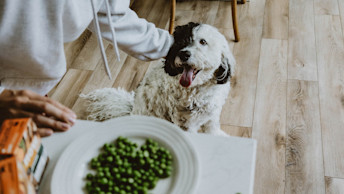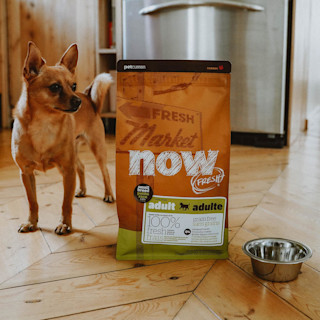March 12, 2024
Can Dogs Eat Peas?

Can dogs eat peas? The short answer is yes, dogs can safely eat peas. In fact, adding peas to your dog's diet can provide a number of nutritional benefits. Peas contain important vitamins, minerals, and antioxidants that can help to support overall health.
Benefits of Peas for Dogs
Peas are an excellent source of carbohydrates, fibre, protein, and many essential vitamins and minerals to support your dog's good health. Here are some of notable health benefits of peas for dogs:
Digestive Health Support
Peas contain a good amount of fibre, which can aid healthy digestion and regularity in dogs. The insoluble fibre in peas adds bulk to stool and helps food pass through the digestive tract.
Peas also contain prebiotics, a type of fibre that acts as food for the beneficial probiotic bacteria in the gut. Prebiotics help nourish and multiply the good bacteria, which support gut health.
Antioxidant Properties
Peas contain antioxidants like lutein and zeaxanthin that can provide protective benefits for dogs. Peas also contain beta-carotene, which functions as an antioxidant to support overall vitality.
Antioxidants help control oxidative stress and cell damage caused by free radicals in the body. Oxidative stress has been linked to various diseases, including cancer, heart disease, and neurodegenerative diseases. Antioxidants also have anti-inflammatory effects that may reduce inflammation in the body.
Healthy Weight Management
Peas are low in fat and calories, making them a healthy choice for dogs. The high fibre content of peas can also help dogs feel fuller for longer after meals. Fibre can support a feeling of satiation for ‘fullness’, which can reduce begging behaviors between meals.

Supporting a Healthy Immune System
Peas contain a variety of antioxidants and nutrients that can help support your dog's healthy immune system. Peas contain good levels of vitamin C, an antioxidant that supports healthy immune function and neutralizing free radicals. Vitamin C supports the immune system in fighting off sickness.
Sensitivity Support
Peas are considered a novel carbohydrate and protein source, making them a great choice for inclusion in recipes for dogs with food sensitivities or intolerances.
Peas as an Ingredient in Dog Food
In addition to being a source of vital nutrients, peas are often used in dog food as a source of carbohydrates, especially in grain-free formulas. Carbohydrates, including those from peas, contribute to the texture and structure of the food. This is important as it is key to the palatability of the food, which is a very important consideration when crafting dog food diets.

Our Recommendation
Grain-Free Dog Food Recipes
Treat your pup to Now Fresh grain-free dog food. Crafted with fresh meats and fish and nutrient-dense superfoods.
View all dog foodGiving Peas as a Treat
Both fresh and frozen peas can be given as a supplemental treat or mixed into your dog's regular food. Use caution with canned peas as they tend to contain added sodium.
When introducing new treats, always start with a small amount. Treats should make up no more than 10% of your dog's daily caloric intake.
Some easy ways to feed peas to your dog:
- Mixing some peas into their kibble or wet dog food. The peas will add some texture and extra nutrition.
- Hand feeding peas as a treat. Let your dog lick them right from your hand for some bonding time.
- Adding some peas to homemade dog food recipes like stews or baked treats.
- Stuffing peas into a food toy or frozen Kong for mental stimulation.
- Pureeing peas and mixing into frozen lickable treats.
The possibilities are endless when it comes to creatively adding peas to your dog's menu. It's a healthy way to supplement their diet and add variety. Most dogs enjoy peas and have no issues digesting them.
What kinds of peas are safe for dogs to eat?
While these kinds of peas are safe for dogs to eat, ensure that they’re cooked, unsalted, and unseasoned before serving.
Peas that are safe for dogs (when cooked):
- Green peas
- Chickpeas (garbanzo beans)
- Snow peas
- Sugar snap peas
- Split peas
- Black eyed peas
Please note: Always consult your veterinarian or a pet nutrition expert before introducing new foods to your dog's diet. Additionally, it's important to remember that peas should be given in moderation as a treat and should not replace a well-balanced diet tailored for your dog's specific needs.
Conclusion
In conclusion, peas not only serve as a safe snack for dogs, but also an excellent source of many vital nutrients. These include fibre for good digestive health, antioxidants for overall cellular health, and vitamins and minerals to support a strong immune system. Their vitamin and carbohydrate content make them a popular ingredient in dog food diets.
When serving as a treat, always remember to introduce them in a cooked and plain form, excluding any seasoning or spices, while exercising portion control. As with all foods and treats, the key is balance and moderation. Consult your vet before introducing peas or any new food into your dog's diet. Overall, peas offer a myriad of health benefits that can help support the well-being of your pooch.



